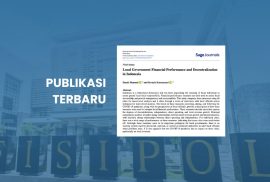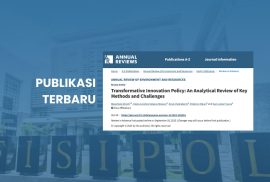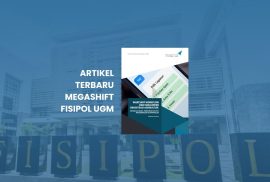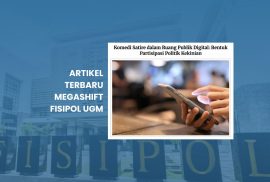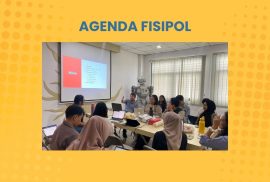Yogyakarta, 2 October 2025–The Faculty of Social and Political Sciences, Universitas Gadjah Mada (FISIPOL UGM) held a workshop entitled “Contesting Hegemony: Labor, Ideology, and the Limits of Resistance in Post-Authoritarian Indonesia” in the FISIPOL UGM’s 4th floor auditorium. The event featured four speakers: Vedi Hadiz (University of Melbourne), Hari Nugroho (Universitas Indonesia), Diatyaka Yasih (Universitas Indonesia), and Muhtar Habibi (Universitas Gadjah Mada). The discussion explored how power, ideology, and the working class interact in Indonesia’s post-New Order political and economic system, as well as the extent to which community survival strategies can develop into forms of resistance against hegemonic domination.
SDGs 10: Reduced Inequalities
The Soenario Kolopaking Team from the Department of Sociology, Faculty of Social and Political Sciences (FISIPOL), Universitas Gadjah Mada (UGM) has won first place in the National Student Scientific Article Competition at the Sociology Competition of Unesa (SOCIUS) 2025, organized by Universitas Negeri Surabaya (UNESA). The competition ran from June 10 to August 3, 2025, and was participated in by eight universities from across Indonesia.
The Soenario Kolopaking Team consists of Nurima Setianingrum and Afkaar Nabil Falah. Under the guidance of Gregorius Ragil Wibawanto, M.A., the team successfully presented their scientific paper titled “The Public Between the State and the Market: The Struggle of Female Online Ojek Drivers in Layered and Persistent Vulnerability.”
Yogyakarta, 12 September 2025 — The International Relations Student Corps (KOMAHI) of the Faculty of Social and Political Sciences (FISIPOL) at Universitas Gadjah Mada officially opened the International Relations English Competition (IREC) 2025, a prestigious annual event for high school students across Indonesia. Over three days, from 12–14 September 2025, participants showcase their English proficiency while deepening their understanding of pressing global issues.
The event began with a keynote lecture by Arief Rizky Bakhtiar, Senior Officer for Analysis and Monitoring on Trade, Industry, and Emerging Issues at ASEAN, who offered insightful perspectives on regional trade dynamics, industry trends, and key strategic issues.
Yogyakarta, 9 September 2025 – The Center for Digital Society (CfDS) at the Faculty of Social and Political Sciences (FISIPOL) Universitas Gadjah Mada celebrated its tenth anniversary under the theme “A New Era to Rethink Digital.” The celebration also marked the launch of the 2025 Digital Intelligence Course (MKKD), which carries the topic “Building a Human-Centered and Inclusive Digital Ecosystem.”
Since its establishment ten years ago, CfDS has consistently empowered communities through research and advocacy in digital transformation. One of its flagship initiatives is MKKD, a free digital literacy class initiated in collaboration with the Ministry of Communication and Digital Affairs (Komdigi) in 2020. To date, MKKD has reached more than 40,000 participants and features instructors from across sectors, including academia, government, and industry.
Bevaola Kusumasari, Ph.D., a lecturer from the Department of Management and Public Policy (DMKP), Faculty of Social and Political Sciences (FISIPOL) UGM, has once again demonstrated her contribution to the international academic arena. She recently published a scholarly article entitled “Local Government Financial Performance and Decentralization in Indonesia.”
This publication examines the financial performance of local governments in the context of decentralization in Indonesia. Drawing on data analysis from 66 cities and in-depth interviews in 4 cities, the study highlights how financial performance measures—such as degrees of decentralization, independence, direct spending, and local revenue growth—are used to evaluate local financial governance.
One of the lecturers from the Department of International Relations (DIHI), Faculty of Social and Political Sciences (FISIPOL) UGM, Suci Lestari Yuana, Ph.D., has once again achieved international academic recognition. Together with her collaborators, she has recently published a scholarly article in the prestigious journal Annual Review of Environment and Resources, titled “Transformative Innovation Policy: An Analytical Review of Key Methods and Challenges.”
The article discusses Transformative Innovation Policy (TIP), a new generation of innovation policy designed to address increasingly complex social and environmental challenges—from energy and food crises to mobility systems that remain entrenched in unsustainable modes of production and consumption. The authors emphasize that merely improving technologies or financial instruments is no longer sufficient. Systemic innovations and transformative policies are needed to enable just transitions, ensuring both social justice and planetary health.
New Release: Megashift FISIPOL UGM Article
“Digital Orchestration for Indonesian Agriculture: From WhatsApp Workflow to Food Security”
By: Setiawan Guntoro
Megashift FISIPOL UGM has once again published an article that sparks discussion on the future of agriculture and food security in Indonesia. This piece highlights a simple yet revolutionary idea: how an everyday app like WhatsApp can become the backbone of agricultural digitalization.
The article sheds light on a long-standing issue in agriculture, particularly in broiler farming: the slow flow of field data from farms to management, which often leads to delayed and risky decision-making. Many agritech startups have failed because their applications did not match farmers’ habits. However, WhatsApp—used by 9 out of 10 Indonesians—emerges as an alternative solution.
New Release: Megashift FISIPOL UGM Article
“Satirical Comedy in the Digital Public Sphere: A Contemporary Form of Political Participation”
By: Ardi Muhammad Rifqi
____________________
Megashift FISIPOL UGM has published a fresh article exploring how satirical comedy on social media has become a creative and powerful form of political participation in today’s digital era. Written by Ardi Muhammad Rifqi, the article dissects how humor, memes, and stand-up comedy content are reshaping political discourse in Indonesia.
The article highlights three main drivers behind the rise of satire: the accessibility of social media platforms, the growing popularity of stand-up comedy, and restrictions on free expression under regulations like the ITE Law. Within this context, satire emerges as a safe yet sharp tool for citizens to voice criticism and hold political actors accountable.
The Institute of International Studies (IIS), Department of International Relations, Universitas Gadjah Mada (UGM), organized an enumerator training on Tuesday, August 26. This activity is part of a two-year research project titled Connect, Defend, and Act! (CDA), initiated by Hivos and the Humanis Foundation, with support from Norad – Norwegian Agency for Development Cooperation.
The training was designed to equip enumerators with skills in data collection, coding techniques, and interview methods to monitor the condition of civic space and democracy in Indonesia. The sessions were delivered by Daniel Petz and Nadya Zafira, both experienced in research on civil society and human rights issues.
Dr. Nurhadi, lecturer at the Department of Social Development and Welfare (PSDK), Faculty of Social and Political Sciences, Universitas Gadjah Mada (FISIPOL UGM), participated in a visiting scholar program at BRAC University, Dhaka, Bangladesh, from August 6–15, 2025. The program aims to strengthen international academic collaboration, particularly in poverty alleviation studies through the Graduation Approach.
BRAC University was chosen due to its close connection with BRAC International, the institution that pioneered the Graduation Approach in the early 2000s. Today, this method has become a global reference in poverty reduction strategies, including in Indonesia.




